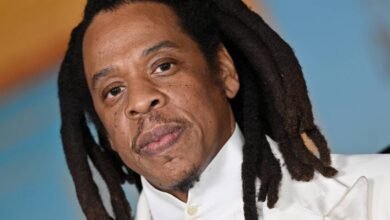Tuareg Guitar Virtuoso Mdou Moctar Unplugs for ‘Tears of Injustice’

Five months ago, Tuareg guitarist Mdou Moctar released a new album called Funeral for Justice, a furious, frenetic fusion of psychedelia, hard rock, and West African desert blues that left critics across the globe stunned. “It’s hard to miss the sound of righteous fury in its opening guitar chords,” wrote Pitchfork’s Arielle Gordon, “which ricochet like the first shots in battle.” Rolling Stone’s Jon Dolan hailed it as “the band’s most forceful album yet, tailor-made to melt minds at massive festivals.”
The lyrics, delivered in Moctar’s native Tamasheq language, reflect the rage of a nation that has endured centuries of exploitation by French colonial powers and outside corporations with more interest in extracting gold and uranium from the ground than uplifting the lives of the people. “The strong try to hurt the weak,” Moctar tells Rolling Stone via a WhatsApp call from Niger, where he lives. “We feel that it’s not justice.”
In July 2023 — just days after Niger’s president, Mohamed Bazoum, was forcibly removed from power following a military coup, and with months left to go before the release of Funeral for Justice — Moctar and his band headed into a studio in Brooklyn, New York, to re-record the album utilizing acoustic instruments. The result is the mournful Tears of Injustice, due to arrive Feb. 28, 2025, on Matador Records.
The anger and frustration of the original songs are still present on the re-recording, but the lyrics have been moved to the forefront. “On Funeral for Justice, we tried to give all our energy to make it fast and get everyone to dance,” says Moctar. “Here, we want you to listen and understand everything I’m saying.”
According to Mikey Coltun, the band’s New York-based producer and bassist, the Brooklyn sessions provided a welcome distraction while Niger was in a state of extreme distress, and Moctar and his other bandmates didn’t know when they’d be able to return home and see their families. “It was a very tense session,” Coltun says. “The guys are really drawn to their phones. But we turned off the wi-fi and just focused on the songs, even though they didn’t still didn’t know if they’d be able to go back home.”
Moctar, Coltun, drummer Souleymane Ibrahim, and rhythm guitarist Ahmoudou Madassane tracked live in the studio without headphones. “A lot of these songs were one take or two takes,” says Coltun. “One of us would just start playing a song in a different feel, and everyone would jump on board. We would just hit record and go. We wanted it to feel like we were just sitting around in Niger with each other, very casually.”
Overdubs were kept to a bare minimum, but they did add in group vocals from singers back home in Niger. “These are songs about what’s happening to the Tuareg people and what’s happening in Niger and West Africa,” says Coltun. “It didn’t feel right to exclude that group of people and have that emotion. When we threw that into the record, it kind of tied everything together.”
Moctar emphasizes that the themes of the record are universal even if they were inspired by the situation in his home country. “Look at Ukraine,” he says. “Look at Afghanistan, Senegal, Sudan, Palestine, Libya. These places all have problems. Children and old people, women, are being killed. All of this doesn’t make sense to me. To me, the justice doesn’t exist. There’s people behind all this misery who are happy because they’re going to get money for it. It’s not fair.”
It’s been nearly a decade since Moctar began playing gigs around the planet, winning over sometimes-skeptical crowds one by one. “A lot of people in the States have never been around West African culture,” Coltun says. “And we come onstage in turbans and bubus [robes]. When we toured with Tame Impala, people laughed when we walked out. But by the end of the show, everyone was screaming for us.”
Moctar has taken much of the money he’s earned and used it to dig wells across Niger. In the future, he hopes to open up a school for women. And no matter what happens to his career going forward, he says that Niger will always remain his home. “I share so much with my community,” he says. “I understand when they are in a good situation or not. I love them. I just travel to the West for work. I prefer to stay in Africa.”
Source link



